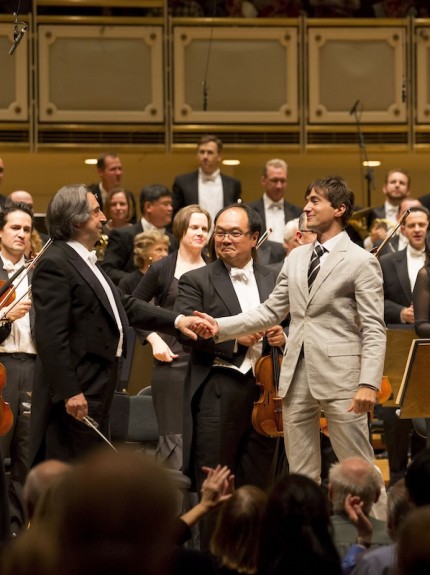Muti, CSO wrap the season in style with Tchaikovsky, Bates premiere and “Chelsea Dagger”

Let it be said that while the main works on Thursday night’s season-closing program of the Chicago Symphony Orchestra were given their due, there is something unequivocally and uniquely awe-inspiring about Riccardo Muti leading a CSO performance of “Chelsea Dagger.”
The 2006 song by The Fratellis is the anthem of the Chicago Blackhawks and served as an impromptu mid-concert bonus marking the team’s Stanley Cup victory earlier this week. In his witty and somewhat bemused introduction, Muti characteristically drew a broader frame of reference, speaking of the importance of sport and a sound body leading to a sound mind. He then launched the orchestra in his own lively arrangement, mainly leaning back on the podium railing and just letting the smiling players enjoy their rousing tribute to Chicago’s Stanley Cup winners.
The main order of business in this final season program was the world premiere of Anthology of Fantastic Zoology, the final fruit of Mason Bates’ five-year tenure as CSO composer in residence.
Inspired in equal parts by Jorge Luis Borges’ Manual de zoologia fantastica and Saint-Saens’ Carnival of the Animals, Bates has crafted a kaleidoscopic half-hour work, choosing an array of Borges’ mythical creatures to paint in eleven interstiched sections. Dedicated to Muti, Zoology is the 37-year-old composer’s largest and most ambitious orchestral work to date, scored for huge forces and massive percussion battery.
I’ve been ambivalent about Bates’ music and there are some less convincing elements of this new work. The composer’s well-worn habit of flinging populist rhythmic riffs between different players and sections surfaces more than once (“The Sprite”), a device that feels like padding and which Bates seems to falls back on whenever he runs out of ideas. Also having two offstage violinists on either side felt like a gimmicky theatrical conceit when any front-stand CSO violinist is fully capable of creating a distanced effect on stage.
That said, Anthology of Fantastic Zoology marks Bates’ most successful achievement with the CSO and closes out his five-year residency on a high note. His orchestration now sounds less self-conscious, and is wielded with greater facility and confidence. While still audacious in seeking a brilliant effect (there is a wind machine), the writing is more economical for all the outsized resources and crafted with greater precision.
The sequencing of Zoology’s separate sections wasn’t always easy to follow, unaided by a confusing layout of the titles in the program. There are plenty of flashy moments in this big work as one would expect with hard-charging strings and let-it-rip bravura for brass and percussion.
Yet some of the most striking moments came in the more restrained sections. “Nymphs” presents a delicate duo for two clarinets underpinned by a warmly lyrical supporting theme in the strings. Also affecting was the “Sirens” section with a touching theme for violins (on stage and off) that offers one of Bates’ loveliest melodic inspirations.
If Zoology seems to lose some momentum after the halfway mark, one feels that there is a superb 20-minute piece lurking within the work’s current 30-minute span.
It’s too bad the CSO’s music director doesn’t venture outside of his Austro-German-Russian comfort zone more often in Chicago since his widely spaced performances of contemporary music are always of the highest order. Leading his sole world premiere of the season, Muti and the orchestra gave Zoology a debut of striking power, brilliance and panache, with the CSO members at their considerable finest, individually and as an ensemble. All Bates’ iridescent coloring and effects came through with bracing clarity and transparency even in the most uninhibited moments. The composer has become a popular figure with local audiences and Zoology was received with a sustained roaring ovation and repeated curtain calls.
Tchaikovsky’s Symphony No. 5 is hardly the most imaginative way to close a music season (the New York Philharmonic wrapped last week with Honegger’s Jeanne d’Arc au Bûcher). But Thursday’s fiery Fifth rounded off Muti’s season-long Tchaikovsky symphony cycle in resounding style.
Even in such a familiar warhorse there wasn’t a hint of routine. Muti’s Tchaikovsky leans toward taut drama rather than lyrical warmth, as with the craggy sonorous blast of the fate motif near the end of the Andante. Yet the conductor drew out the contrasts more than usual, in a hushed and spacious approach to the opening pages and his dexterous scaling of cello dynamics at the start of the slow movement.
Guest horn Andrew Bain (principal of the Los Angeles Philharmonic) lofted a poised and noble solo in the Andante. The Waltz went with lilting elegance and Muti and the players built the finale to a brassy and triumphant coda.
The program will be repeated 1:30 p.m. Friday and 8 p.m. Saturday. cso.org; 312-294-3000.
Posted in Performances





Posted Jun 20, 2015 at 10:29 am by Cele
I was priviledged to be at this closing-season concert and this review helps to put some technical comments and remarks on my perception of Bates’ inspiring piece. After some revisions, it may be a classic of 21st century music.
Thank you so much.